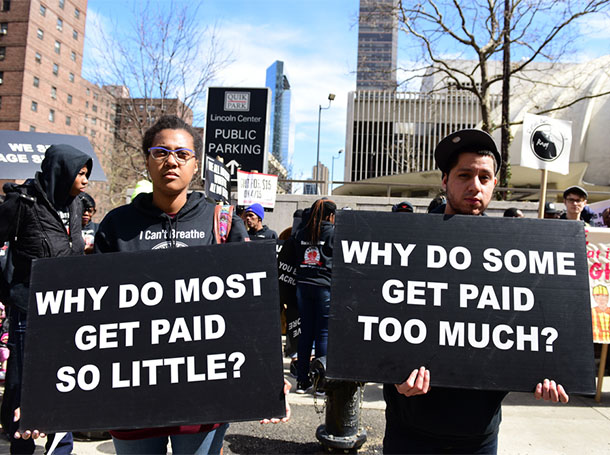NDP leader John Horgan's first big election promise -- a $15 minimum wage -- has been greeted with an eerie silence from the usual suspects in the low-wage lobby.
A B.C. Chamber of Commerce spokesperson expressed some concern. Energy Minister Bill Bennett proclaimed the government's opposition to having the highest minimum wage in Canada.
But Horgan's recent commitment to move from the lowest minimum wage in Canada to the highest has mostly escaped criticism.
Perhaps that's because the groups pushing to keep wages low have cried wolf before, and been caught out.
When Premier Christy Clark announced increases to the minimum wage in 2011, the usual suspects rang the alarm bells.
Never mind that the wage had been frozen at $8 an hour for a decade. Clark's minimum wage plans would bring disaster, the extremist business groups said.
Clark's overdue increases raised the minimum wage from $8 to $8.75 on May 1, 2011, with two more increases taking it to $10.25 within a year -- about 28 per cent in total.
Most of the business community accepted the need for an increase to a wage that left people in poverty. And while the minimum wage isn't a perfect tool, there is a consensus that increases in the wage reduce both inequality and the number of people living in poverty.
But some lobby groups issued warnings of economic catastrophe when Clark announced plans to increase the minimum wage. The Canadian Federation of Independent Business (CFIB) predicted 32,760 to 199,560 lost jobs in the province. (That's based on the CFIB projection of jobs lost due a 10 per cent increase in the minimum wage.)
The Fraser Institute predicted job losses of 26,097 to 57,194. In an op-ed column for the Vancouver Sun, the institute's spokespeople were more specific. "By our estimates, hiking the minimum wage to $10.25 an hour from the current rate of $8 an hour will result in a loss of upwards of 46,000 jobs for young workers," they wrote.
Whoops!
And they were dead wrong.
In April 2011, the month before the first of the three minimum wage increases, 2,273,000 British Columbians were employed.
By August 2012 -- 16 months after the first increase, and four months after the full 28 per cent increase had taken effect -- 2,323,000 people were working in the province.
Employment didn't fall as a result of the minimum wage increase. More people were working.
Opponents could still argue that jobs were lost, and the number of people working would have been even higher if the minimum wage had stayed at $8.
But not credibly. Job growth in B.C. over that period was 2.2 per cent, compared with a national average of 1.3 per cent. If the CFIB's mid-point projections were to be believed, then employment in B.C. would have increased 5.5 per cent if not for the minimum wage hike -- more than four times the Canadian average. No serious economist would suggest that was realistic.
The evidence was that the minimum wage increase had no material effect on employment.
That's not surprising. You can easily find economics research papers to support your position on the minimum wage, no matter what it is.
But recently retired Vancouver Sun columnist Don Cayo, writing about Clark's 2011 increases, cited a statement by 650 U.S. economists, including five Nobel laureates. "A modest increase in the minimum wage would improve the well-being of low-wage workers and would not have the adverse effects that critics have claimed," they said.
And in 2013, economist John Schmitt reviewed more than 10 years of research and concluded that "the weight of that evidence points to little or no employment response to modest increases in the minimum wage."
"Modest" is subjective. But Premier Clark's 28 per cent increase in one year had no obvious impact on employment.
The NDP's Horgan is proposing an increase to $15 by 2021, a 33 per cent increase from the rate of $11.25 already scheduled for Sept. 15, 2017. Annual increases of about 7.4 per cent would be enough to achieve the goal, and businesses would have lots of time to prepare.
Schmitt's paper, only 27 pages, is worth reading. It's a reminder that businesses can respond to a minimum wage increase in many ways. They can cut hours for staff, but they can also improve efficiency, invest in training, raise prices or slow salary increases for other employees.
And it notes the economic benefit of minimum wage increases. The proportion of people working for minimum wage has been increasing. In 2013, 6.4 per cent of British Columbians were in minimum wage jobs -- more than 150,000 people.
Assume they work 20 hours a week. Horgan's plan to add $3.75 an hour to their wages means an extra $585 million a year that will be spent in local communities.
The research report also notes that a minimum wage increase, for most businesses, is not a significant cost-driver. Imagine a busy 24-hour convenience store with a manager paid $60,000, an assistant at $40,000 and 14 half-time employees at minimum wage. Horgan's plan would add about two per cent a year to labour costs, and much less to overall operating expenses.
Not just young workers living at home
The issue is tricky for the BC Liberals, as a government into its fourth term. Once, long ago, they could argue that the goal was an economy so strong that employers, desperate for staff, were all paying above minimum wage.
But as more people come to depend on minimum wage jobs each year, that argument just becomes embarrassing.
Clark has focused on the argument that most people on minimum wage are young, and quickly moving on to better jobs.
The reality is not so clear. Across Canada, about 60 per cent of minimum wage workers are under 25, and 57 per cent are living with family members. (That's not necessarily a matter of choice given B.C.'s housing market.)
But more than 40 per cent of minimum wage workers are trying to build a life in their own homes or apartments. Seven per cent of workers over 65 are being paid a government-mandated minimum wage. Walmart can probably afford a raise for its greeters.
The minimum wage is a good test of political core principles. We've mostly agreed the state has a role in setting minimum pay. Just because someone can only command $10 a day in the marketplace doesn't mean an employer should be able to pay that little.
The question then becomes what's a fair, pragmatic minimum wage.
Gordon Campbell's government froze the minimum wage for a decade, effectively rejecting the whole concept. Clark introduced a big increase, and then did stood by as the province once again came to have the lowest minimum wage in Canada at $10.45. (Increases planned for Sept. 15 this year and in 2017 will take the rate to $11.25.)
Horgan's promise of a $15 minimum wage is sound policy -- and a way to stake out an approach starkly different from the Liberal record over four terms in government. ![]()
Read more: BC Politics

















Tyee Commenting Guidelines
Comments that violate guidelines risk being deleted, and violations may result in a temporary or permanent user ban. Maintain the spirit of good conversation to stay in the discussion.
*Please note The Tyee is not a forum for spreading misinformation about COVID-19, denying its existence or minimizing its risk to public health.
Do:
Do not: